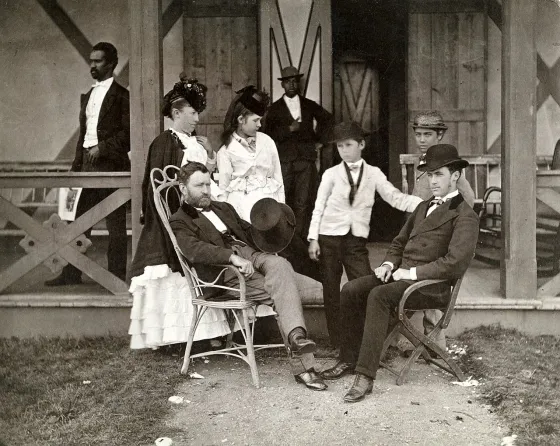Julia Grant

"Dearest Julia." Mrs. General Grant. First Lady Julia Grant. As the years of her life passed, she had many societal titles as she supported and encouraged her husband for nearly four decades. The early years of her marriage to Ulysses S. Grant were difficult, but she would fondly recall their years in the White House as some of her happiest moments.
Julia Dent was born on January 26, 1826—one of Frederick and Ellen Dent's eight children. She grew up at White Haven, a plantation near St. Louis, Missouri, until she was sent to boarding school from ages ten to seventeen to complete her education. She particularly enjoyed reading, riding horses, and playing the piano.
In 1844, Julia’s brother Fredrick returned home for a visit, bringing his former roommate from the United States Military Academy at West Point: Ulysses S. Grant. During this visit, Julia Dent and Ulysses Grant fell in love and became engaged a few weeks later. The engaged couple corresponded as Lieutenant Grant fought in the Mexican-American War. When he returned from war, they married on August 2, 1848.
Julia Grant moved with her husband to several of his military assignments. The couple had four children: Frederick, Ulysses Jr., Ellen (Nellie) and Jesse. Caring for the young children prevented Julia from making the move to the Pacific coast when her husband's military duties took him there. Distances challenged their relationship and family life, and both Julia and Ulysses seemed unhappy in the early years of their marriage. Grant resigned from military service in 1854 and returned to Julia and their children in St. Louis. Though the family was together, Grant struggled to keep a steady job in civilian life, leading to financial instability.
When the American Civil War began in 1861, Ulysses Grant quickly spoke up for the Union cause and by June 1861, he was colonel of the 21st Illinois Volunteer Regiment. Over the next four years as her husband received promotions and eventually rose to the rank of lieutenant general, Julia Grant supported him by taking the children and traveling to his headquarters as frequently as possible. She oversaw the education of their children and also supported the Union war effort, recognized as Mrs. General Grant. She saved correspondence from her husband, and like almost all his letters since their marriage, he signed them with "love and kisses for you and the children."
By the end of the war, Ulysses Grant had been promoted to the rank of full general and hailed as the triumphant hero who rescued the Union from destruction. Three years later—in 1868—Grant ran for President to succeed Andrew Johnson and decisively defeated Horatio Seymour. This began what Julia Grant called the “happiest period” of her life.

During her time as First Lady during her husband's two presidential terms (1869-1877), Julia Grant became widely known for her generosity and skill as a hostess. She hosted the first state dinner held at the White House, welcoming the king of Hawaii Kalakaua in 1874, which would lead to a treaty for trade reciprocity between the United States and the Kingdom of Hawaii in 1875. Occasions like these allowed Julia Grant’s personality to shine, and her social skills strengthened her husband’s diplomatic and domestic efforts. The Grants gave the White House in a Gilded Age renovation prior to the 1874 marriage of their daughter Nellie. The renovations included gas bulb chandeliers which became immensely popular among the elite of American society in the late 1800s.
When Grant’s second term as President came to a close, Julia and her husband embarked on a grand world tour that took them across the globe from France to Germany, Italy, Russia, Greece, India and China. They returned home to the United States in 1879. By the mid-1880s, the Grants faced financial difficulties after poor investments. Ulysses Grant concealed the truth from Julia as long as possible about their nearly penniless situation and his throat cancer. He wrote and sold his memoirs, finishing the writing on his deathbed and trying to provide for Julia. With Julia and their children near him, Ulysses Grant died on July 23, 1885. In a final letter which she discovered after his death, Ulysses acknowledged "I have your love and affections...I bid you a final farewell until we meet in another, and I trust better, world."
Widowed, Julia Grant lived in New York and Washington D.C., comfortably provided for financially with the royalties from her husband's memoirs. She spent her time with her children and grandchildren and publicly promoting her husband's memory. President William McKinley stood beside her in 1897 at the dedication of Grant's Tomb in New York City. Julia Grant maintain many influential friendships with presidents, first ladies and society figures. She quietly wrote her own memoirs—the first First Lady to do so—though they were not published until after her death. Julia Grant died on December 14, 1902, and was buried beside her husband.





